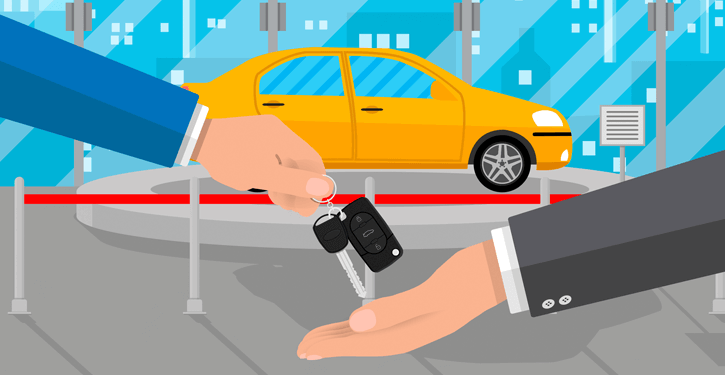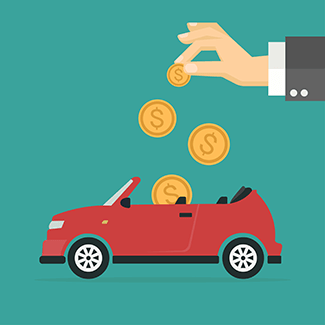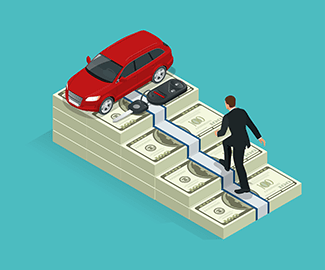You’ve made the decision that you need to buy a car but have no idea how to make sure you get the best deal. We can’t look under the hood, but we can help you get off to a good start.
Lenders will use your credit score to determine your creditworthiness, your employment status, and the vehicle you want to purchase. The best possible auto loan terms go to buyers with the best credit.
Use Credit Sesame to see how your score stacks up
Credit Sesame has tons of tools to help you figure out how to improve your credit standing, but first, you should know the difference between a credit score and a credit report. You’ll need to use both to understand and improve your finances.
Credit Report: a list of data points related to your identity and your history with credit-related products. Some of the data on your credit report is used to calculate your credit score. The report includes a detailed list of all loans and accounts in your name with the balance and status of the loan (active, closed, delinquent), any derogatory marks on your credit, payment history, and the date you opened the account. Open accounts stay on your credit report indefinitely. Closed accounts in good standing are removed ten years after closure. Closed derogatory accounts are removed after seven years. Reviewing your credit report is an excellent way to make sure there aren’t any fraudulent accounts in your name, and that someone else’s accounts aren’t on your credit report by mistake.
Credit Score: a number based on a complex algorithm that considers your payment history, how much revolving debt you carry, the number of times lenders have checked your credit, the average age of your accounts, the age of your oldest account, the variety of credit products you have experience with, and public records such as bankruptcy, liens or judgments..
You can get a free copy of your credit report every 12 months from each major consumer credit bureau (Equifax, Experian and TransUnion) by visiting AnnualCreditReport.com. Free credit reports don’t include your credit score. You can get your credit score for free, updated monthly, from Credit Sesame. Credit Sesame provides a customized dashboard to help you learn more about what factors might be holding your score down, where you’re doing great, and what you can do to improve (because most of us have room for improvement).
What auto lenders look for
Your credit score is definitely important but it’s not the only thing a lender looks at when you apply for a loan. Lenders will also consider your employment status and income level,down payment amount, the age of the vehicle, and the repayment term.
Credit score
Your credit score is a great indicator of your creditworthiness. Ideally, you want a score above 720, but the higher the score, the better. Any score above 640 is considered good.
Keep in mind that your credit utilization and payment history have the biggest impact on your credit score. So try to keep credit card balances low and always pay your bills on time.
Employment status and income
Lenders want to know you can afford to make the payments on the loan. Some lenders may ask for proof of employment and income, such as a recent paystub. Others may ask you to name your employer on the loan application.
Debt to income ratio (DTI)
It won’t matter how much you make if all of your income already goes towards your debt. Responsible lenders measure your required minimum monthly payments against your take-home pay to determine whether you can reasonably afford to repay the loan.
Down payment amount
The more money you put down, the less the lender has to finance. The less they have to finance, the lower their risk, the easier it becomes to lend to you.
Age of vehicle
The age of the car can make a difference in your ability to secure financing. A new car is less likely to become worthless during the life of the loan. Depending on the purchase price, a used car might not last as long as the debt. A smart lender won’t set up a long term loan for a low value car.
Repayment term
The repayment terms determine the size of your monthly payments. The shorter the term, the larger the monthly payment. For example, if you borrow $10,000 to buy a car with a repayment term of three years, your monthly payment, not accounting for interest, would be $278. If you take six years to pay off the loan, your monthly payment is $139.
How to fix and protect your credit and finances to buy a car
Correct any errors on your credit report
Review your credit reports carefully for errors. If you find a mistake, reach out to the credit bureau reporting the error to file a dispute.
Evaluate the cost of your desired car
Know the value of the car you want to buy. Pick the car out before visiting the dealership. Get pricing in advance through your bank or TrueCar, or check Kelley Blue Book. Many prices can be negotiated even further in person.
Save for a down payment for your car
The bigger your down payment, the less money you have to borrow to buy a car. The less money you borrow, the easier it is to qualify, and less the loan will cost over time because you’ll pay less interest.
Make on-time payments on all your bills
The more on-time payments you make, the higher your payment history score. Late payments stay on your credit report for seven years, but hurt your score less and less as time goes by. The most recent two years are the most influential.
Lower your credit utilization
Credit utilization is the amount of revolving debt you have compared to the total amount of credit available to you. It is calculated overall, and for each credit card. If you have a $500 balance on a card with a $1,000 limit, your utilization is 50%. Try to get this percentage below 30. Below 10% is even better.
You can lower your utilization two ways. One is to pay down your debt. This should be your goal anyway, since debt reduction leads to better financial health.
The other is to increase the amount of credit that is available to you by getting a new credit card but NOT charging it up, or by getting credit limit increases on existing accounts. Some card issuers will raise your limit automatically after a period of responsible use. If you ask for a credit limit increase, be aware that doing so will result in a hard inquiry on your credit report.
Pay off other debt

Do not close accounts
The length of your credit history impacts your credit score. The older your credit history, the better.
If you have one account that has been open for ten years and one open for five years. Then your average age is 7.5 years. Open accounts keep getting older (people with top credit scores often have accounts that are 25 years old or older). Closed accounts will fall off your report after 7-10 years, depending on the account status at the time of closure.
Avoid applying for credit unless you really need to
Inquiries come in two varieties: hard and soft. Each hard inquiry can knock a few points from your credit score. Your score should recover from the dip within a few months. Hard inquiries result any time you apply for credit.
A soft inquiry has no effect on your score. When Credit Sesame looks at your credit, that’s a soft inquiry. The same is true when you check your own credit in any way.
For some types of loans, including auto loans, you can apply with multiple lenders without risk of great damage to your score caused by multiple inquiries. The credit scoring agencies know you want to shop around for the best deal. If you keep your rate shopping to a 14-45 day time frame, all of the inquiries that come from auto lenders will be treated as a single inquiry for credit scoring purposes. The length of the shopping window depends on the credit scoring model used, and that’s up to each individual lender, so to be safe, do your shopping within 14 days.























